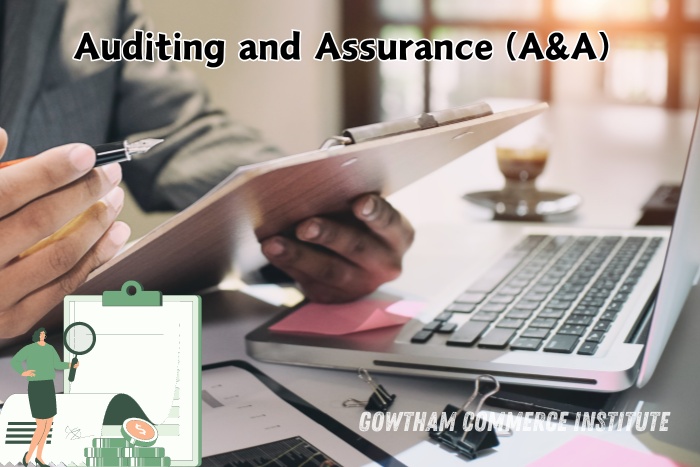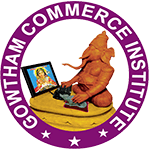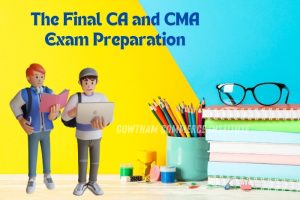Hi there, aspiring CMAs! 🌼 You’re probably balancing tension and enthusiasm as you get ready for your CMA Intermediate tests. But don’t worry—Gowtham Commerce Institute in Peelamedu, Coimbatore, is here to help you easily navigate through this crucial time. Everything you need to know about the CMA Intermediate examinations, including test format, study advice, and exam-winning techniques, will be covered in this thorough book. Now let’s get started!
Understanding the CMA Intermediate Exam
A crucial step on your path to becoming a cost and management accountant is passing the CMA Intermediate test. It helps you become ready for advanced subjects in financial management and management accounting by building on the groundwork established in the CMA Foundation course. The exam is divided into two groups, each comprising four papers:
Group I
- Financial Accounting (FA)
- Laws, Ethics, and Governance (LEG)
- Cost Accounting and Financial Management (CAFM)
- Taxation (TX)
Group II
- Advanced Accounting (AA)
- Auditing and Assurance (A&A)
- Management Information Systems and Strategic Management (MIS & SM)
- Financial Management and Economics for Finance (FM & EFF)
Each paper is designed to test your theoretical knowledge and practical application skills. Here’s how you can effectively prepare for these exams.
Crafting an Effective Study Plan
Why It Works
A well-structured study plan ensures comprehensive coverage of the syllabus and efficient use of time. It helps you stay organized and focused, preventing last-minute cramming sessions.
How to Do It
- Break Down the Syllabus: Divide the syllabus into smaller, manageable sections.
- Set Clear Goals: Define weekly and monthly goals to track your progress.
- Allocate Time Wisely: Prioritize subjects based on your strengths and weaknesses.
- Include Regular Breaks: Short breaks during study sessions can enhance productivity.
Sample Study Plan
- Monday to Friday: Focus on theory subjects in the mornings and practical subjects in the afternoons.
- Saturday: Review the week’s studies and practice past papers.
- Sunday: Rest or engage in light revision.

Mastering Concepts Thoroughly
Why It Works
A strong understanding of concepts helps in answering both theoretical and practical questions effectively. It also ensures that you can apply your knowledge in real-world scenarios.
How to Do It
- Use Multiple Resources: Refer to ICAI study materials, reference books, and credible online sources.
- Interactive Learning: Engage in study groups or join coaching classes for discussions and doubt clarification.
- Practical Application: Regularly practice problems to apply theoretical knowledge.
Key Resources
- ICAI Study Material: Your primary source for all subjects.
- Reference Books: For deeper understanding and additional practice.
- Online Forums: Engage with peers and experts for tips and clarifications.
Regular Revision
Why It Works
Regular revision ensures retention and understanding of studied material. It helps reinforce your memory and ensures that you don’t forget important concepts.
How to Do It
- Weekly Reviews: Set aside time each week to review what you’ve studied.
- Create Summary Notes: Summarize key points and formulas for quick revision.
- Use Visual Aids: Charts and diagrams can help remember complex information.
Effective Revision Techniques
- Flashcards: Create flashcards for important terms and concepts.
- Mind Maps: Use mind maps to connect different topics and subtopics.
- Quizzes: Test yourself regularly to gauge your understanding.
Practicing Past Papers and Mock Tests
Why It Works
Practicing past papers and mock tests familiarizes you with the exam format and improves your time management skills. It also helps identify your strengths and areas needing improvement.
How to Do It
- Simulate Exam Conditions: Take mock tests under timed conditions.
- Review Answers: Analyze your performance to identify strengths and weaknesses.
- Focus on Improvement: Allocate extra time to areas where you score lower.
Mock Test Schedule
- Monthly Mock Tests: At the end of each month, take a full-length mock test.
- Weekly Practice: Solve past papers and sample questions every week.

Joining a Reputable Coaching Institute
Why It Works
Expert guidance and structured coaching can significantly enhance your preparation. A good coaching institute provides a supportive learning environment, access to quality resources, and regular assessments.
How to Do It
- Join Gowtham Commerce Institute: Benefit from experienced faculty and personalized coaching.
- Regular Classes: Attend classes regularly and participate actively.
- Utilize Study Materials: Make the most of the comprehensive study materials provided.
Why Choose Gowtham Commerce Institute
- Experienced Faculty: Learn from seasoned professionals.
- Personalized Attention: Small batch sizes for individual focus.
- Comprehensive Resources: Access to updated and well-researched materials.
- Regular Assessments: Continuous evaluation through tests and quizzes.
Subject-Wise Strategies
Financial Accounting (FA)
- Master Basics: Ensure a strong foundation in basic accounting principles.
- Practice Regularly: Solve accounting problems frequently.
- Stay Updated: Keep abreast of changes in accounting standards.
Laws, Ethics, and Governance (LEG)
- Understand the Laws: Thoroughly read and understand all laws in the syllabus.
- Use Mnemonics: Create mnemonic devices to remember key legal provisions.
- Analyze Case Studies: Study past cases to understand the application of laws.
Cost Accounting and Financial Management (CAFM)
- Focus on Concepts: Understand the underlying concepts thoroughly.
- Solve Problems: Regular practice with numerical problems.
- Use Graphs and Charts: Visual aids can simplify cost behavior and analysis.
Taxation (TX)
- Keep Updated: Stay informed about the latest tax laws and amendments.
- Practice Calculations: Regular tax calculations for accuracy.
- Real-Life Scenarios: Apply theoretical knowledge to practical scenarios.
Advanced Accounting (AA)
- Master Advanced Topics: Focus on complex accounting standards and issues.
- Regular Practice: Continuously solve advanced problems.
- Seek Help: Don’t hesitate to seek clarification on difficult topics.
Auditing and Assurance (A&A)
- Understand Standards: Familiarize yourself with all auditing standards.
- Focus on Procedures: Pay attention to auditing procedures and techniques.
- Case Analysis: Study past audit cases to understand practical applications.
Management Information Systems and Strategic Management (MIS & SM)
- Learn IT Systems: Understand the functioning of enterprise information systems.
- Develop Strategies: Use case studies to develop strategic thinking skills.
- Interactive Sessions: Participate in group discussions and interactive sessions.
Financial Management and Economics for Finance (FM & EFF)
- Master Financial Concepts: Focus on key financial management principles.
- Practice Numerical Problems: Regular practice to improve speed and accuracy.
- Stay Informed: Keep updated on the latest economic trends and policies.

Conclusion
Preparing for your CMA Intermediate exams can be challenging, but with the right strategies and support, you can excel. At Gowtham Commerce Institute in Peelamedu, Coimbatore, we are committed to providing you with the best resources and guidance to achieve your goals. Follow these proven strategies, stay dedicated, and you’ll be well on your way to success. Join us and take the first step towards a rewarding CMA career!
Ready to excel in your CMA Intermediate exams? Join Gowtham Commerce Institute today!





